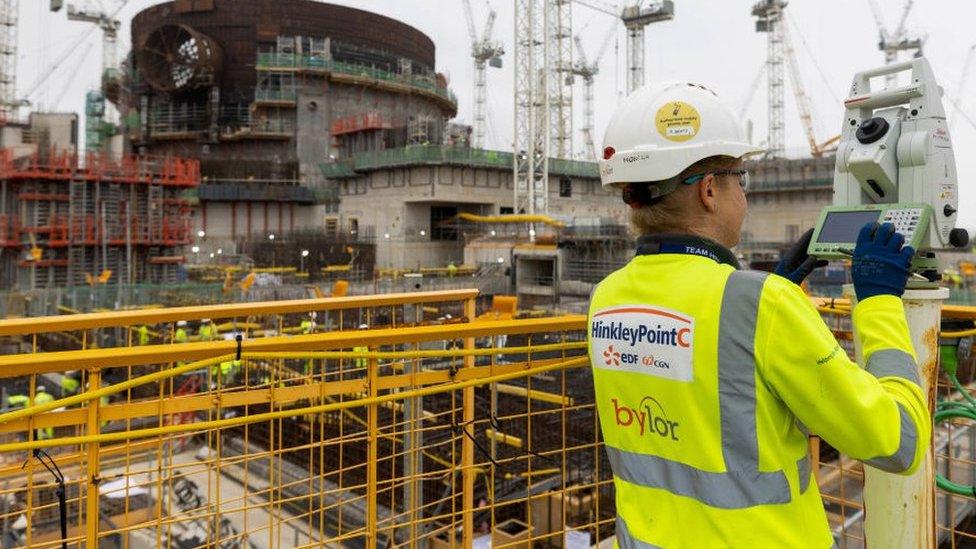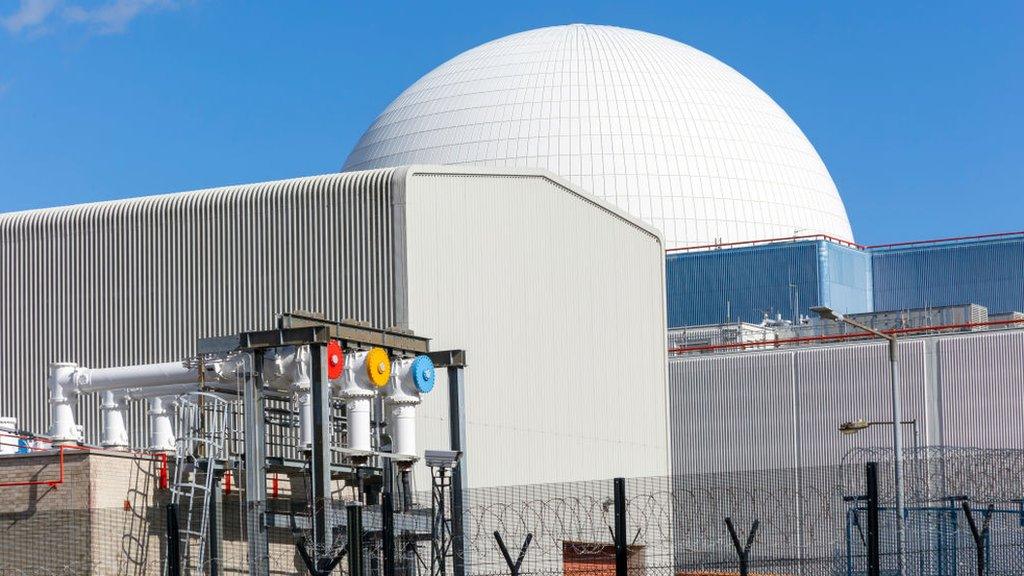Hinkley C: UK nuclear plant price tag could rocket by a third
- Published
- comments

The final cost of the Hinkley Point C nuclear plant being built in Somerset may soar by about a third, according to the French firm developing it.
EDF now estimates that the cost could hit £46bn, when taking price rises into account.
The completion date could also be delayed by three years.
The revised estimates come after the government recently announced ambitions for the biggest expansion in nuclear power for 70 years.
The UK government has said in the past it wants nuclear to provide up to 25% of the UK's electricity needs by 2050 as part of its plans to combat climate change.
A government spokesperson said the new plant is "not a government project" and as such "any additional costs or schedule overruns are the responsibility of EDF and its partners and will in no way fall on taxpayers".
Once Hinkley C is complete, it is expected to generate enough electricity to supply some six million homes, for the next 60 years.
The French state-owned firm manages all five nuclear power stations that are currently generating electricity in the UK, along with three that are defueling, the first stage of winding down operations.
In 2022, the cost of the UK's first new nuclear plant since the 1990s was estimated at £26bn, with a target date for completion of June 2027.
Previous cost estimates have been expressed in 2015 prices for easy comparison over time.
But taking inflation into account, the previous estimate on final costs of £26bn works out at £34bn today. The updated estimate of £31-35bn, could see costs hit £46bn in today's prices - an increase of about a third.
In a letter to staff, seen by the BBC, Stuart Crooks, the managing director of Hinkley Point C, said there were 7,000 substantial design changes required by British regulations that needed to be made to the site, with 35% more steel and 25% more concrete needed than originally planned.
The project has also faced severe delays because of supply chains being hit during the pandemic, as well as labour shortages.
"Going first to restart the nuclear construction industry in Britain after a 20-year pause has been hard," Mr Crooks wrote.
"Like other major infrastructure projects, we have found civil construction slower than we hoped and faced inflation, labour and material shortages, on top of Covid and Brexit disruption," he added.
He pointed out, however, that UK bill payers will not be directly affected by those building and cost time overruns.
The French firm EDF agreed to shoulder the risk and pay the full cost of construction, including any increases. This was in return for an agreed electricity price that was substantially higher than the average price in 2015 and would only rise in line with inflation.
"It is important to say that British consumers or taxpayers won't pay a penny, with the increased costs met entirely by shareholders," Mr Crooks' letter read.
However, this price shock comes at a sensitive time for the UK government, which has agreed to allow construction costs for a new plant at Sizewell in Suffolk to be added to customers' bills gradually over the decade which it will take to build.
The government has also just doubled its own investment into Sizewell C to £2.5bn and is in the process of raising capital from private investors.
Last week, the government triggered a "development consent order" that allows early-stage construction to begin in Suffolk despite several legal challenges from local and national opponents who have taken their fight to the Supreme Court.
Alison Downes of the campaign group Stop Sizewell C said that the announcement of additional funding was"inexplicable" following news of delays to one of the government's key nuclear projects.
She described the Hinkley and Sizewell projects as an "unmitigated disaster".
"The government should cancel Sizewell C instead of handing over scarce billions that could be used instead for renewables, energy efficiency or - in this [general] election year - schools and hospitals," she added.
However, Tom Greatrex, chief executive of the Nuclear Industry Association, the industry trade body in the UK, said that "Hinkley Point C is an integral part of the UK's route to energy security and decarbonisation."
Like fossil fuels, nuclear fuels are non-renewable energy resources.
But nuclear power stations do not produce greenhouse gases like carbon dioxide or methane during their operation, although the construction of new plants is costly and does generate a low level of emissions through the manufacturing of materials needed like steel.
Mr Greatrex said: "What is important now is that we act with pace and scale alongside other clean energy technologies as we shift towards a net-zero future."
A spokesperson for the Department for Energy Security and Net Zero said: "We've ended the stop-start approach to nuclear and recently launched a roadmap setting out the biggest expansion of nuclear in 70 years, simplifying regulation and shortening the process for building new power stations - meaning cleaner, cheaper and more secure energy in the long-term."
Related topics
- Published9 January 2024
